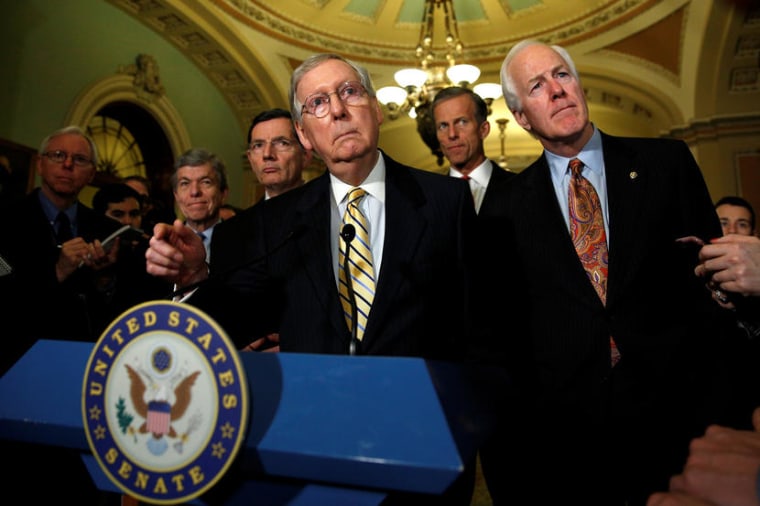Late on Friday, Senate Majority Leader Mitch McConnell's (R-Ky.) set in motion a plan to quickly pass a massive economic stimulus package, and at first blush, the schedule appeared encouraging.
There was no bill at the time, but according to McConnell's plan, officials would iron out the details in negotiations over the weekend, hold a procedural vote on Sunday afternoon, and then move toward a floor vote on Monday morning -- preferably before Wall Street trading began.
A vote to advance the massive coronavirus stimulus bill failed on Sunday night in the Senate as negotiations had yet to produce a deal on the more than $1 trillion aid package.... Republicans, who needed 60 votes to move forward on the bill, weren't able to win over any Democrats to proceed, meaning no aid will flow to the economy -- including checks to individuals, help for small businesses and bailouts for big corporations -- until an agreement is reached.
Yesterday afternoon's Senate vote was 47 to 47, suggesting there's still quite a bit of work to do.
So what's the trouble? There have been plenty of direct talks between congressional leaders and Treasury Secretary Steven Mnuchin, and while no detailed blueprint has been released to the public, the current size of the rescue package is reportedly around $1.8 trillion. The cost gradually grew, at least in part, because Democrats pushed for additional funds for hospitals and health-care providers.
The main sticking point, however, is a huge chunk of the pie: a $500 billion pool of money for corporate aid. The existence of that pile of money is not necessarily a problem, since it stands to reason that the federal stimulus plan would assist the private sector.
Rather, the problem is with its structure: under the Republican proposal, there are few worker protections, and even fewer constraints on how the pool of money would be distributed. As a practical matter, the Trump administration would have the authority to use the half-trillion-dollar pool of money however it saw fit, with inadequate transparency. Democrats, not surprisingly, saw this as a bridge too far.
To hear GOP leaders tell it, Dems aren't taking "yes" for an answer, since Republicans were willing to move on some key provisions -- including unemployment insurance and access to direct-aid benefits. But there's still a $500 billion stumbling block standing in the way of success.
In the meantime, House Democratic leaders are reportedly eyeing their own alternative rescue plan, which is likely to be quite different from McConnell's plan, and which may extend the negotiations.
Watch this space.
